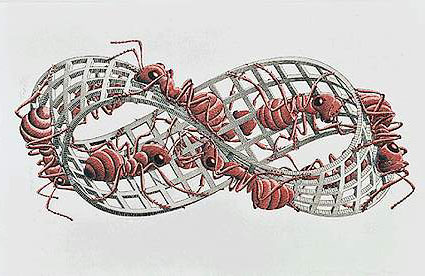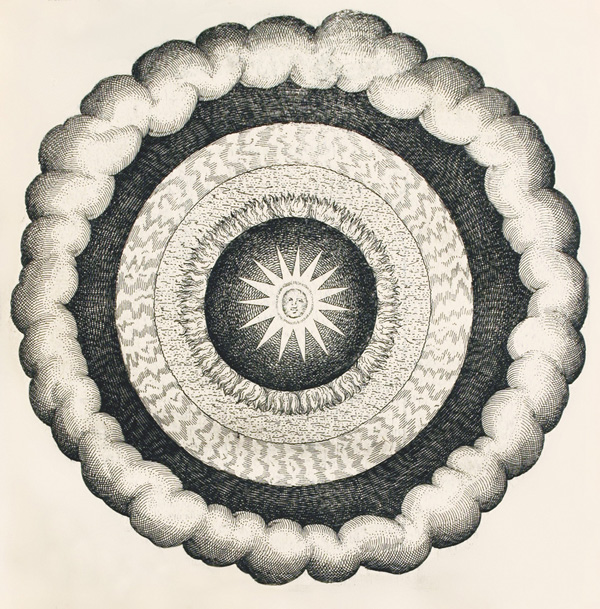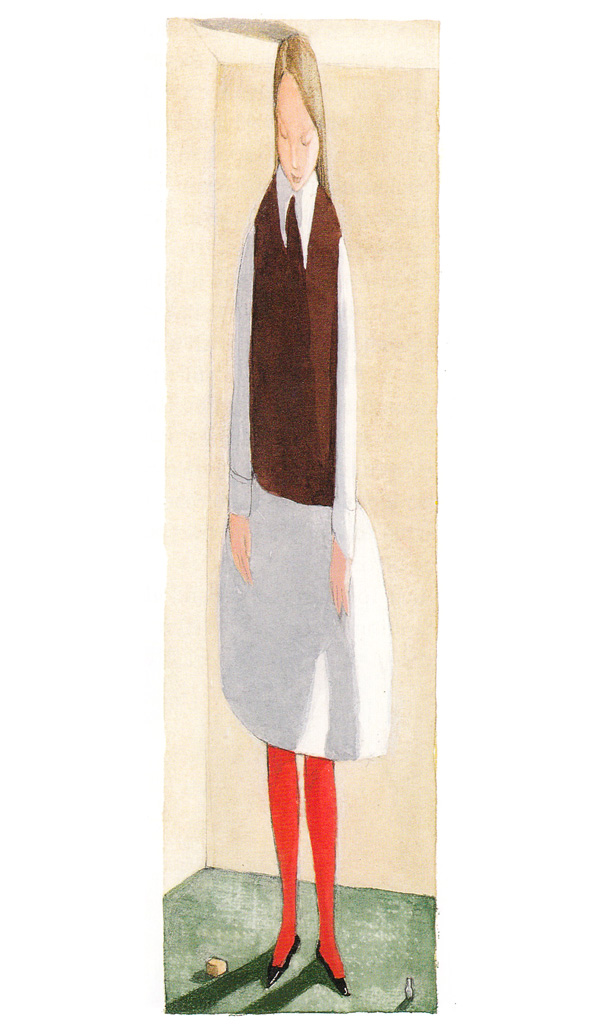
You can, in fact, travel in a straight line and you will, in fact, end up where you started.
Part of Einstein's genius was to realize that space is curved.
The Absurdity of Infinity: Astrophysicist Janna Levin Explains Whether the Universe Is Infinite or Finite in Letters to Her Mother
by Maria Popova
“The simpler the insight, the more profound the conclusion.”
 In 1998, while on the cusp of becoming one of the most significant theoretical cosmologists of our time, mathematician-turned-astrophysicist Janna Levin left her post at Berkeley and moved across the Atlantic for a prestigious position at Cambridge University. During the year and a half there, she had the time and space to contemplate the question that would eventually become the epicenter of her career — whether the universe is infinite or finite. What began as a series of letters to her mother, Sandy, eventually became an unusual diary of Levin’s “social exile as a roaming scientist,” and was finally published as How the Universe Got Its Spots: Diary of a Finite Time in a Finite Space(public library) — a most unusual and absorbing account of the paradoxes of finitude.
In 1998, while on the cusp of becoming one of the most significant theoretical cosmologists of our time, mathematician-turned-astrophysicist Janna Levin left her post at Berkeley and moved across the Atlantic for a prestigious position at Cambridge University. During the year and a half there, she had the time and space to contemplate the question that would eventually become the epicenter of her career — whether the universe is infinite or finite. What began as a series of letters to her mother, Sandy, eventually became an unusual diary of Levin’s “social exile as a roaming scientist,” and was finally published as How the Universe Got Its Spots: Diary of a Finite Time in a Finite Space(public library) — a most unusual and absorbing account of the paradoxes of finitude.
“I’m writing to you because I know you’re curious but afraid to ask,” Levin offers in the opening letter — a “you” that instantly becomes as much her mother as the person Virginia Woolf memorably termed “the common reader.” From there, she springboards into remarkably intelligent yet inviting explorations of some of the biggest questions that the universe poses — questions most of us contemplate, sometimes consciously but mostly not, just by virtue of being sentient participants in the chaos and enchantment of existence.

A 1617 depiction of the notion of non-space, long before the concept of vacuum existed, found in Michael Benson's book 'Cosmigraphics'—a visual history of understanding the universe. Click image for more.
In an entry from September 3, 1998, Levin fleshes out her ideas on infinity and writes with exquisite Saganesque sensitivity to the poetics of science:
For a long time I believed the universe was infinite. Which is to say, I just never questioned this assumption that the universe was infinite. But if I had given the question more attention, maybe I would have realized sooner. The universe is the three-dimensional space we live in and the time we watch pass on our clocks. It is our north and south, our east and west, our up and down. Our past and future. As far as the eye can see there appears to be no bound to our three spatial dimensions and we have no expectation for an end to time. The universe is inhabited by giant clusters of galaxies, each galaxy a conglomerate of a billion or a trillion stars. The Milky Way, our galaxy, has an unfathomably dense core of millions of stars with beautiful arms, a skeleton of stars, spiraling out from this core. The earth lives out in the sparsely populated arms orbiting the sun, an ordinary star, with our planetary companions. Our humble solar system. Here we are. A small planet, an ordinary star, a huge cosmos. But we’re alive and we’re sentient. Pooling our efforts and passing our secrets from generation to generation, we’ve lifted ourselves off this blue and green water-soaked rock to throw our vision far beyond the limitations of our eyes.The universe is full of galaxies and their stars. Probably, hopefully, there is other life out there and background light and maybe some ripples in space. There are bright objects and dark objects. Things we can see and things we can’t. Things we know about and things we don’t. All of it. This glut of ingredients could carry on in every direction forever. Never ending. Just when you think you’ve seen the last of them, there’s another galaxy and beyond that one another infinite number of galaxies.

Illustration from Thomas Wright’s visionary 1750 treatise 'An Original Theory,' found in Michael Benson's book 'Cosmigraphics'—a visual history of understanding the universe. Click image for more.
But having painted this bewitching backdrop for our intuitive beliefs, Levin sublimates the poet to the scientist, pointing out that however alluring these intuitions may feel, they are nonetheless ungrounded in empirical fact:
No infinity has ever been observed in nature. Nor is infinity tolerated in a scientific theory — except we keep assuming the universe itself is infinite.It wouldn’t be so bad if Einstein hadn’t taught us better. And here the ideas collide so I’ll just pour them out unfiltered. Space is not just an abstract notion but a mutable, evolving field. It can begin and end, be born and die. Space is curved, it is a geometry, and our experience of gravity, the pull of the earth and our orbit around the sun, is just a free fall along the curves in space. From this huge insight people realized the universe must be expanding. The space between the galaxies is actually stretching even if the galaxies themselves were otherwise to stay put. The universe is growing, aging. And if it’s expanding today, it must have been smaller once, in the sense that everything was once closer together, so close that everything was on top of each other, essentially in the same place, and before that it must not have been at all. The universe had a beginning. There was once nothing and now there is something. What sways me even more, if an ultimate theory of everything is found, a theory beyond Einstein’s, then gravity and matter and energy are all ultimately different expressions of the same thing. We’re all intrinsically of the same substance. The fabric of the universe is just a coherent weave from the same threads that make our bodies. How much more absurd it becomes to believe that the universe, space and time could possibly be infinite when all of us are finite.
A decade and a half later, Alan Lightman would come to write with a similar scientific poeticism about why we long for permanence in a universe defined by constant change. But however poetic the premise, Levin brings a mathematician’s precision to her “reasons for believing the universe is finite, unpopular as they are in some scientific crowds.” In another entry twelve days later, she writes:
Infinity is a demented concept…Infinity is a limit and is not a proper number. No matter how big a number you think of, I can add 1 to it and make it that much bigger. The number of numbers is infinite. I could never recite the infinite numbers, since I only have a finite lifetime. But I can imagine it as a hypothetical possibility, as the inevitable limit of a never-ending sequence. The limit goes the other way, too, since I can consider the infinitely small, the infinitesimal. No matter how small you try to divide the number 1, I can divide it smaller still. While I could again imagine doing this forever, I can never do this in practice. But I can understand infinity abstractly and so accept it for what it is.
Pointing out that all titans of science — including Galileo, Aristotle, and Cantor — were besotted with the notion of infinity at some point, “each visiting the idea for a time and then abandoning the pursuit,” Levin notes that we can neither accept nor dismiss infinity on the basis of popular opinion alone. In early October, she writes:
Where in the hierarchy of infinity would an infinite universe lie? An infinite universe can host an infinite amount of stuff and an infinite number of events. An infinite number of planets. An infinite number of people on those planets. Surely there must be another planet so very nearly like the earth as to be indistinguishable, in fact an infinite number of them, each with a variety of inhabitants, an infinite number of which must be infinitely close to this set of inhabitants. Another you, another me. Or there’d be another you out there with a slightly different life and a different set of siblings, parents, offspring. This is hard to believe. Is it arrogance or logic that makes me believe this is wrong? There’s just one me, one you. The universe cannot be infinite.[…]I welcome the infinite in mathematics, where … it is not absurd nor demented. But I’d be pretty shaken to find the infinite in nature. I don’t feel robbed living my days in the physical with its tender admission of the finite. I still get to live with the infinite possibilities of mathematics, if only in my head.
Understanding the infinite — both as a mathematical possibility and an impossibility of the physical universe — might be more a matter of coming to terms with infinite simplicity than with infinite complexity. In an entry from early February of 1999, Levin echoes Margaret Mead’s famous proclamation about clarity and writes:
I try to find a simple expression for my ideas. I figure if there is none, the ideas must be wrong. When I first started to work on topology I wondered about complex properties of spaces and didn’t take my own suggestions seriously until I realized the simple way to ask the question: is the universe infinite? Einstein’s simplest insights were profound. The simpler the insight, the more profound the conclusion.
In the remainder of How the Universe Got Its Spots, which is unbearably beautiful in both intellectual elegance and stylistic splendor, Levin goes on to explore questions of quantum relativity and freewill, death and black holes, spacetime and Wonderland, and more. Complement it with Levin on science, free will, and the human spirit, then revisit Alan Lightman on how dark energy explains why we exist and treat yourself to this poetic primer on the universewritten in the 1,000 most common words in the English language.

No comments:
Post a Comment